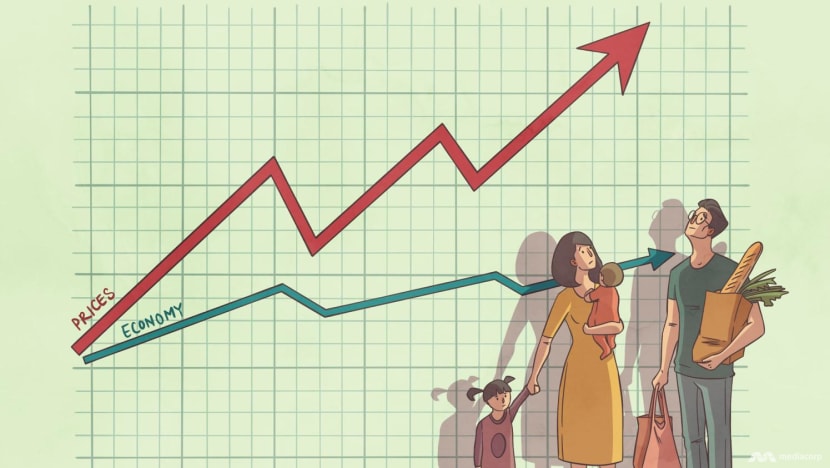SINGAPORE: About two to 3 weeks in the past, Mr Kevin Soh observed that milk powder for his two younger kids had turn into S$4 dearer per tin.
A 1.6kg tin for his three-year-old daughter, who consumes two tins a month, now prices S$66, up from S$62. His seven-month-baby son, in the meantime, makes use of three to 4 850g tins a month, and the worth for these has hiked from S$46 to S$50 every.
“It’s actually quite taxing on us,” stated Mr Soh, 35, who works in advertising and marketing. “And I’d clarify that these prices are from a neighbourhood market provision shop in Jurong West, not the standard retail price in supermarkets, which can be even more costly.”
Beyond milk powder, Mr Soh has additionally been spending extra on different family bills. A packet of boneless cod fish chunks for his kids, for instance, now prices S$45, up from S$38 final 12 months.
He has additionally been paying S$40 extra per thirty days for electrical energy for each his place and his mom’s dwelling, after he was quoted an almost 20 per cent greater fee when he recontracted his electrical energy plan final September.
Thankfully, Mr Soh and his household have been in a position to deal with the upper family bills for now, because the take a look at and measuring tools manufacturing business that he works in has been largely spared from the COVID-19-induced financial downturn and his firm has been in a position to proceed giving out pay increments to its workers.
However, these working in industries instantly affected by inflationary pressures are feeling the pinch.
Taxi driver Andy Guan, 40, has been bearing the brunt of gasoline costs which have soared after Russia invaded Ukraine in February.
Before the gasoline hikes in the beginning of the 12 months, he was paying about S$70 on common for a full tank of gasoline after reductions. That identical quantity now prices him round S$100.
Mr Guan stated this has induced his earnings to drop by a minimum of 40 per cent. He now intends to cease driving a taxi and begin doing meals supply.
“For the man in the street, they don’t need an economist to tell them that their standard of living has been significantly affected in the last few months,” stated economist Walter Theseira, an affiliate professor on the Singapore University of Social Sciences (SUSS).
“What matters to them has gone up in price — their utility bills, their food, their petrol — and if their wages don’t respond soon, their real standard of living will be at risk of declining this year.”
Inflation has turn into one in every of 2022’s greatest financial tales, not solely in Singapore, but in addition in lots of nations as a confluence of world occasions is putting upward stress on costs.
In January, Singapore’s core inflation — which excludes non-public transport and lodging prices — rose 2.4 per cent from a 12 months in the past, the very best since September 2012, pushed by greater costs of meals, electrical energy and gasoline. Meanwhile within the United States, inflation fee is at its highest in 4 a long time, with its Consumer Price Index reaching 7.9 per cent year-on-year in February.
Inflationary pressures have been build up as economies world wide attempt to recuperate from COVID-19, with demand for items and providers returning even because the world’s provide chains have but to totally recuperate from pandemic-related disruptions.
The struggle between Russia and Ukraine couldn’t have come at a worse time: Energy costs particularly have risen sharply over the previous 12 months and the battle has pushed costs up even greater, with Singapore fuel pump prices reaching their highest degree on document in current weeks.
The spike comes as some Western nations such because the US and Canada have determined to halt imports from Russia, the world’s third-largest oil exporter, in response to its navy actions. This means they’ve to purchase their oil from different producers, resulting in greater costs.
Even as costs rise, the Russia-Ukraine struggle — together with its financial and political ramifications — appears to be like set to impede and even derail financial recoveries as nations emerge from downturns led to by COVID-19.
All these are setting the stage for an ideal storm threatening to blow the world economic system off track, in keeping with economists and policymakers.
They are even speaking concerning the return of stagflation, which the world has not seen because the Seventies’ oil shock. Combining financial stagnation and inflation, it’s a state of affairs the place an economic system faces the dual challenges of gradual financial development and joblessness amid rising inflation.
At an investment conference last week in Singapore, Senior Minister Tharman Shanmugaratnam warned that the chance of stagflation may be very actual in lots of elements of the superior and growing world.
“Higher-for-longer inflation is now very likely, and so is slower growth,” he stated. “It complicates what was already an extremely difficult task for central banks, particularly in the advanced world — the task of balancing growth and inflation considerations.”
But past central banks’ actions on rates of interest, nations even have to handle “a broader set of shocks”, he warned.
“This time it’s not just oil prices, it’s food, it’s a range of industrial metals, it’s fertilisers and other commodities. The war and sanctions are also further disrupting supply chains that were beginning to recover after the last two years,” stated Mr Tharman.
Calling this an “unprecedented situation”, he added: “We have to plan for a range of scenarios, but tilted very much towards the downside”.
WILL THE GHOST FROM Seventies RETURN?
With the Russia-Ukraine battle threatening to reshape the worldwide financial panorama, skilled traders world wide are rising more and more frightened concerning the outlook for international development.
In the Bank of America’s newest Global Fund Manager Survey, which canvasses the views of fund managers managing about US$1 trillion (S$1.36 trillion) in belongings each month, 62 per cent of respondents stated they forecast stagflation, greater than double from February’s studying of 30 per cent.
While Singapore-based economists weren’t anticipating stagflation primarily based on the present financial state of affairs, a few of them famous the elevated danger of such a state of affairs taking part in out.
Mr Hartmut Issel, UBS Wealth Management’s head of Asia Pacific equities and credit score, stated that the financial institution’s base case is that there won’t be stagflation within the US.
And given Singapore’s financial hyperlinks to the worldwide economic system, the financial institution additionally doesn’t suppose it is going to occur right here, he stated.
“The (US Federal Reserve) made it very clear now… that they are determined to tackle the potential predicament early on while the US economy is still growing above trend rates,” stated Mr Issel, including that some drivers of inflation within the US are exhibiting early indicators of abating.
Earlier this week, the US Federal Reserve raised its benchmark rate of interest for the primary time since 2018 and signalled extra fee hikes that may carry the speed to a variety between 1.75 per cent and a pair of per cent on the finish of the 12 months.
Before this, rates of interest had been pinned to zero because the begin of the COVID-19 pandemic in a bid to cushion the blow of a deep recession.
When rates of interest are minimize, borrowing turns into cheaper. Households turn into extra prepared to borrow cash to make huge purchases and increase spending within the economic system. Businesses additionally profit because it encourages them to make massive tools purchases which may increase output.
To preserve inflation manageable, nonetheless, the US Federal Reserve raises the rate of interest to cut back the demand for spending, and the other occurs.
Mr Issel stated: “If one assumes the Fed gets the trade-off right where both inflation and GDP growth speed are moderating in the second half of this year, it is natural to extend this trend to Singapore.”
For Singapore, the financial institution is forecasting a 5 per cent GDP development for 2022 and a pair of.8 per cent development for 2023, together with an inflation peak of round 3.6 per cent this 12 months and a pair of.3 per cent subsequent 12 months.
Mr Issel famous that whereas excessive oil costs could have a dampening impression on international development, the vitality depth of developed market economies has come down dramatically because the Seventies.
Back then, 3 times the quantity of oil was wanted to supply one unit of GDP in comparison with at this time, he stated.
CIMB Private Banking economist Song Seng Wun believes it’s too early to inform if development in Singapore’s economic system will gradual or unemployment will rise within the coming months, although it’s a state of affairs his financial institution is watching out for.
“So far, we have rising inflation — that’s one of the three (conditions for stagflation). The labour market… is still supportive of wage growth, that’s still good. And depending on the sector, some workers will see a contracting in real wages while others may not,” stated Mr Song.
He famous that within the latest Ministry of Manpower (MOM) labour market report, the ratio of job emptiness to unemployed individuals rose to 2.11 in December final 12 months, in contrast with 1.95 in September.
“There are clearly more jobs available than can be filled from a local labour force, which is why for now, while businesses are worried about what’s happening in Europe and the impact of the supply chain on costs, they’re still essentially keeping their fingers crossed,” he stated.
He added: “Though inflation has gone up, motorists complain but they still fill up the tank. You and I still carry on living life as per normal, whether that’s (spending on) food and beverages or, say, travel. So it’s a slight moderation (in confidence) rather than a complete pullback in activities.”
Still, throughout a media briefing on the MOM report, officers voiced concern that greater inflation and additional provide chain disruptions may have knock-on impacts on the labour market.
DBS Bank senior economist Irvin Seah stated that even when there’s a slowdown in development from final 12 months and a pick-up in inflation in Singapore, it could not imply that the nation is in stagflation.
Rather, he sees it as a transient normalisation course of because the economic system reopens from the pandemic.
This is particularly as Singapore’s economic system grew 6.1 per cent 12 months on 12 months within the fourth quarter of final 12 months, which Mr Seah stated is roughly twice the nation’s potential development fee — a calculation which economists use to estimate the speed of development an economic system can maintain below regular financial circumstances.
He places Singapore’s potential development fee at between 2.5 and three.5 per cent.
“That should be used as a reference point,” he stated. So lengthy as Singapore’s financial development stays inside or above that vary, then it may be safely assumed that any slowdown is a part of the normalisation course of.
But if inflation stays excessive and financial development dips beneath potential, then Singapore can be in a stagflationary situation, he stated.
“I am not discounting the possibility,” Mr Seah stated. “There are some pre-conditions that are gradually emerging and we are not at that stage yet.”
The Ministry of Trade and Industry forecasts Singapore’s GDP to develop 3 to five per cent in 2022.
Economist Selena Ling, head of treasury analysis and technique at OCBC Bank, stated that stagflation is turning into extra doubtless with development prospects going through larger dangers from the Russia-Ukraine struggle and different geopolitical uncertainties, such because the US probably delisting some Chinese tech corporations.
“The probability of stagflation has risen from very ballpark numbers of 10 per cent to around 25 to 30 per cent,” she stated, in keeping with her personal estimates.
With the US Federal Reserve elevating rates of interest and related hikes anticipated by many different central banks together with within the United Kingdom and Australia, Ms Ling famous that central banks are treading a nice line between combating inflation and inadvertently hurting enterprise and client confidence.
But whereas the economic system could also be going through dangers forward, development prospects haven’t fully derailed, she stated. For now, she doesn’t see any outright recession dangers outdoors of the instantly impacted economies of Russia and Ukraine.
Major economies such because the Eurozone will take successful from greater costs, particularly energy-related, and face larger provide chain disruptions for an entire slew of commodities together with meals, metals and neon, she stated.
“But the labour markets of the US and also Singapore are actually in healthy shape,” she added.
IMPACT OF STAGFLATION IF IT COMES TO PASS
If international inflation stays excessive over the following few months and staff world wide begin to realise that their price of residing has outpaced their wage development, then they could begin to pare again on their spending.
Economic actions throughout would then begin to gradual as extra folks really feel the impression of upper prices. Consequentially, hiring would start to gradual.
This is the place stagflation begins making its presence felt.
SUSS’ Assoc Prof Theseira stated that the sustained discount of residing requirements would put tons of of tens of millions of individuals globally into or nearly into poverty, and hurt the flexibility of growing economies to hitch the ranks of the middle-income nations.
“It would likely precipitate political crises globally and even regionally,” he stated.
In Singapore, folks get pleasure from being in a wealthy nation that may higher afford international value will increase, he famous. Petrol costs right here could also be greater than in different nations however Singaporeans additionally earn way more than residents in lots of nations the place petrol is affordable.
“I’m not sure they would want to switch places with, say, someone in Malaysia who has much cheaper petrol and food, but who gets paid much less as well,” he stated.
“The only way out for a country like Singapore is really to ensure that our citizens’ purchasing power, in global terms, is high enough to be able to afford price increases.”
Beyond this, what are the opposite instruments out there to Singapore policymakers?
Mr Song stated that when inflation is led to by home elements, akin to excessive rental costs or labour prices, policymakers in Singapore have extra instruments to carry it down — akin to by tightening down on hypothesis or tweaking overseas employee insurance policies.
But when costs are excessive attributable to provide elements outdoors of Singapore’s management, as is the current case, then it turns into tougher to clamp down on inflation.
Nevertheless, Mr Song stated that if wage calls for by staff to deal with the upper lifestyle turns into too excessive for companies, the Government may additionally minimize employers’ Central Provident Fund contributions, which was what occurred through the recession in 1986.
When an economic system falls into stagflation, Assoc Prof Theseira stated that it usually forces policymakers to think about coverage choices which may be extremely damaging to the economic system and other people’s lives, and but these should be higher than risking costs spiralling upwards with out development.
At the top of the Seventies, for instance, the US Federal Reserve used extraordinarily excessive rates of interest to tame inflation. In Singapore, responses to historic recessions such because the early Nineteen Eighties recession — broadly attributed to wage will increase being too sharp and out of sync with development — have additionally concerned radical insurance policies akin to sharply chopping or freezing wages.
“The policies to correct a severe economic crisis are invariably painful, but may be necessary medicine. Let’s hope it doesn’t come to that,” stated Assoc Prof Theseira.
Stagflation, if it happens, would additionally put the MAS in a repair — ought to it tighten or ease financial coverage?
In such a situation, DBS’ Mr Seah stated he sees a robust position for fiscal coverage by the usage of authorities spending. For instance, Singapore may introduce a supplementary Budget to assist development, whereas the central financial institution eases financial coverage a bit of, however maintains a gradual forex appreciation to tame inflation.
STAGFLATION WOULD BE A HUGE BLOW TO THE ECONOMY
Stagflation would even be an enormous blow to the worldwide and home economies, coming so shut on the heels of the pandemic.
“There has been little breathing room between the pandemic and this new challenge, so many industries and firms have been struggling to get back on their feet,” OCBC’s Ms Ling stated. “This could potentially be a knockout blow for some that have not been able to recover to pre-COVID levels yet.”
Indeed, the rising price of residing has already taken a toll on some staff in sectors hit laborious by the pandemic over the previous two years.
Since the onset of the pandemic, taxi driver Kirsty Foo, 62, stated her earnings haven’t been sufficient to cowl her automotive’s day by day rental of S$120 with ComfortDelGro.
Ms Foo lives along with her 64-year-old cousin, who can be working, in a three-room public housing flat in Queenstown.
For the entire of final 12 months, she has been forking out between S$20 and S$90 a day from her personal pocket.
To cope along with her bills and to pay for her father’s nursing dwelling prices, which have gone up from S$500 to S$600 final 12 months, she has been dipping into her retirement fund.
With costs persevering with to rise additional this 12 months, she has needed to make changes to her high quality of residing. She can now afford to go to a restaurant solely a few times a month, as an alternative of as soon as each week.
Ms Foo stated she is because of go to a health care provider to debate having surgical procedure on her leg a while quickly, after which she wouldn’t be capable of drive for 3 months.
“If I take up the operation then I will completely give up taxi driving. But I’ll continue working, whatever I can do I’ll do.”
For others, like hawkers Elayne Ang, 41, and her husband Samuel Tan, 37, the inflation is hitting them laborious whilst their enterprise has but to recuperate from the pandemic.
The stallholders of Tian Kee Carrot Cake at Block 84 Marine Parade Central Market and Food Centre had elevated the worth of their carrot cake on Jan 1 from S$3.50 to S$4 to maintain tempo with rising prices of substances.
But since Russia invaded Ukraine three weeks in the past, the prices have soared even additional.
Ms Ang stated that the worth of a tin of vegetable oil had been going up by about S$1 each month final 12 months, then S$1 each two weeks in the beginning of this 12 months. After the Ukraine battle broke out, costs have been taking pictures up each week.
According to the hawker couple, a tin of vegetable oil that used to price S$22 final 12 months is now about S$50. A tray of eggs used to price S$3 to S$4 final 12 months however is now nearly S$7. Electricity costs, too, have risen from about S$700 a month final 12 months to S$1,000 now.
Meanwhile, their enterprise continues to be affected by the protected distancing measures in place at eateries: The capability of the hawker centre they’re working at has been capped at 250, as an alternative of its full capability of 800.
“On our end, we already increased prices on Jan 1. We can’t possibly increase by another 50 cents, that’s not fair to the consumer,” stated Ms Ang.
For Mr Soh, the daddy of two, he considers himself fortunate that his family funds — which his spouse additionally contributes to — have been holding up properly amid the rising price of family bills.
But he stated {that a} huge motive his household has not needed to minimize their spending up to now this 12 months is that he has been working nearly seven days per week together with emceeing at weddings on weekends.
He began the facet enterprise along with his spouse 5 years in the past for further revenue. When their kids have been born, the cash he obtained from his wedding ceremony gigs have been put into an emergency fund for the household.
“All these economic uncertainties over the past years made me feel that I have to continuously earn money in order to make sure life is sustainable,” he stated.
“At the same time, it’s very hard to juggle because we want to find a balance between work and family. Sometimes on weekends when I run my show, I miss out on the opportunity to have time with my kids.”
Mr Soh stated that he has been monitoring the struggle in Ukraine to see if it is going to begin to have an effect on the availability of semiconductors, which his business is intently associated to.
“If the war continues and the (shortage) of semiconductors kicks in, then will it affect my industry and job stability? All this adds up and snowballs to the fear that we are facing,” he stated.
This story was originally published in TODAY.

Source : channelnewsasia.com
The post The Big Read: Stagflation nightmare – will prices keep rising even as a European war puts damper on economy? first appeared on Umorr.






